20 Best AI Apps In 2026
Are you on the lookout for the 20 best AI apps in 2026? Are you interested in what the best AI app currently is or what AI apps everyone is using? You've come to the right place.
Go on reading and explore 20+ best AI applications I hand-picked for you.
In this article
- Top 20 AI Apps to Use in 2026
- Other Top Trending AI Apps
- The Best AI Apps by Category
- Planning to Launch an AI Application for Your Business?
- Frequently Asked Questions on AI Apps
The AI market size is expected to grow at a compound annual growth rate of 17.3% and reach a market value of almost $740 billion in 2030. As AI technology evolves, more businesses are expected to switch to AI processes. According to a latest 2025 report, the global artificial intelligence software market is expected to grow at a CAGR of approximately 54 percent to reach a projected value of US$22.6 billion. And the global artificial intelligence (AI) software market is projected to grow rapidly in the coming years and reach approximately US$126 billion by 2025.
Developing an AI app requires a thorough understanding of artificial intelligence fundamentals, deep learning algorithms, data handling, AI development tools, software development frameworks, cloud computing, etc.
If you don’t have a professional development team with relevant expertise to take on the task, you can outsource your AI app project to a competent software development company like DevTeam.Space. It's a vetted community of expert software engineers who have profound experience in building AI-powered software solutions.
Now, let's go back to exploring what the AI app market is currently offering. Here is our list of the 20 best AI apps of 2026.
Top 20 AI Apps to Use In 2026
Let's explore each of these top 20 AI apps in detail.
1. ChatGPT
ChatGPT was launched by OpenAI, an AI and research company, in November 2022 and has generated quite a buzz since then. Remarkably, ChatGPT had 100 million active users just two months after its launch.
ChatGPT is a natural language processing tool powered by advanced generative AI. It can understand human language and respond conversationally.
The NLP language model can answer user questions and help with tasks such as writing an email, a poem, a piece of code, etc. Users are also asking ChatGPT to write essays, create a simple app, write Excel formulas, summarize content, write cover letters, translate text in multiple languages, etc.
ChatGPT is trained on vast textual data on the internet, including websites, books, articles, etc., using a combination of supervised and unsupervised machine learning techniques.

Get a complimentary discovery call and a free ballpark estimate for your project
Trusted by 100x of startups and companies like
ChatGPT can give instant answers on almost every topic on the Internet and offers advice, creative inspiration, professional input, and learning opportunities.
ChatGPT on the web is available for free as it is still in the feedback-collection and research phase. A paid version, ChatGPT Plus, is also available on a $20/month subscription with perks like faster response times, access to the internet through plugins, etc.
The free ChatGPT uses GPT-3.5 LLM (large language model), while ChatGPT Plus offers access to the advanced GPT-4 model by OpenAI.
In January 2024, OpenAI unveiled their GPT Store to ChatGPT Plus, Team and Enterprise subscribers. The GPT Store is the place where users can find useful and popular GPTs — tailored versions of ChatGPT designed to help people with specific tasks in their day-to-day activities.
OpenAI also made available the ChatGPT iOS app in May 2023. The app can sync conversations, support voice input, etc. Since late July 2023, the ChatGPT app for Android devices has been available on Google Play.
2. Grok
In December 2023, Elon Musk's xAI startup launched Grok, a conversational generative chatbot that claimed to have a sense of humor and the ability to answer intricate questions with wit.
Currently, Grok is available in beta version for X Premium+ subscribers in the United States only. The company promises that the Grok-1 model powering the much-talked-about chatbot will evolve with ‘each passing week’ and offer users to join the Grok waiting list.
The tool received its name after the verb ‘to grok’ Robert Heinlein used in his sci-fi novel Stranger in the Strange Land. To grok is to understand an observed object so deeply that the observer merges with it.
True to its name, one of Grok’s distinctive features is the real-time knowledge of the world due to direct access to X, formerly Twitter. This fact probably implies that the tool is always ‘in the loop’. It should be noted, however, that the training data used for the release version of Grok-1, according to the model card, comes from the internet up to Q3 2023. The card says that training data was also provided by AI Tutors.
There are a bunch of interesting numbers behind Grok-1 coming from a series of evaluations that the tool’s developers conducted using standard machine learning benchmarks. The model showed remarkable results, surpassing ChatGPT-3.5 in its compute class and only being beaten by models that had been trained on significantly larger amounts of data and compute resources like GPT-4.
While the new tool seems to be progressive and innovative, it still has imperfections common for generative AI. In particular, the xAI team admits that Grok can hallucinate.
3. DeepSeek
DeepSeek is an AI chatbot developed by the Chinese artificial intelligence startup DeepSeek. Released in January 2025, it quickly gained popularity and surpassed ChatGPT as the most-downloaded free app on Apple’s App Store in the United States by the end of the month.
Along with an iOS app, DeepSeek is available on web. It is based on the DeepSeek-R1 model and is designed to process complex language tasks efficiently using advanced techniques like the Mixture of Experts (MoE). MoE activates only relevant parameters for a specific task.
Its main functions and capabilities are very much similar to those of ChatGPT and include the following:
- Natural language processing (NLP) and understanding
- Content creation and summarization
- Coding and debugging support
DeepSeek is open-source, allowing developers to download, modify, and build upon its code.Importantly, DeepSeek is programmed to comply with Chinese censorship policies, which means it can evade certain topics.
4. Claude
Claude is yet another generative AI chatbot. It was developed by Anthropic, an AI safety-focused company, and is positioned as a helpful, honest, and harmless AI assistant.
It was built using Constitutional AI, a set of techniques developed by researchers at Anthropic. Constitutional AI is a training approach that ensures adherence to ethical guidelines and minimizes biased outputs.
Claude is able to analyze large documents such as books, reports, or transcripts in a single interaction. It’s good for tasks such as summarization, Q&A, creative writing, and content editing. It provides multilingual support.
Like other chatbots, Claude provides coding assistance. It can generate code snippets, explain functionality, and assist with debugging of code written in various programming languages.Claude has both free and paid plans.
5. Bing AI
In February 2023, Microsoft announced its new version of the Bing search engine with an AI chat feature powered by the same technology as ChatGPT, GPT-4.
The Bing AI chat supports ChatGPT as the default search experience, which provides ChatGPT access to the entire internet and information on current events. With OpenAI integration, Bing web traffic increased by 15.4%.
The AI chat app offers complete answers to users that can be summarized for better clarity. Users get an improved and interactive chat interface for complex conversations such as planning a trip itinerary, etc. Bing AI is also capable of creative writing, such as interview preparations, essay writing, etc.
Microsoft has completely updated the user experience of the Edge browser with AI technology. Edge now offers two main features: chat and compose.
The Edge sidebar can be used to summarize a lengthy text with key takeaways, and the chat feature can be used to answer related questions.
The compose feature can write new content for users based on user prompts. Users can also update the tone, length, and format of the text content.
Microsoft Bing AI is now available for everyone and without a waitlist. According to Microsoft, Bing has grown to 100 million daily active users, and the daily installations of the Bing mobile app have increased 4 times since its launch.
6. Gemini
Gemini is an AI model developed by Google DeepMind based on the LaMDA language model. It is designed to handle and integrate multiple types of data, such as text, images, video, and audio, to perform complex tasks and generate more contextually relevant responses.
Key features of Gemini
- Multimodal capabilities. While many AI models focus on a single type of data, Gemini can analyze multiple data types at a time. For example, it can recognize a picture, understand the text within it, and generate a response that combines both.
- Gemini is designed to integrate with Google's existing AI tools and infrastructure, such as Google Cloud AI or other DeepMind projects.
- Gemini can use memory, reasoning, and planning to help complete tasks under human supervision.
- It has multimodal live API that can help developers build applications with better natural language interactions and video understanding.
Gemini can be used for research, playing video games, as a coding agent capable of fixing bugs, editing and validating code, and more.
7. Otter AI
Otter.ai uses artificial intelligence to develop speech-to-text transcription applications. Otter.ai apps allow users to document automatic meeting notes with real-time transcriptions or recorded audio. Users can use Otter AI chat in meetings to ask questions and get instant answers.
Multiple users can also collaborate on Otter AI and hold discussions. The AI application can also generate content, such as writing emails, meeting summaries, action points, etc.
Otter AI offers use cases for multiple teams, like product, media, and sales. The Otter AI solutions include individual, business, and education.
Otter AI for business allows you to connect Microsoft and Google calendars with OtterPilot. OtterPilot can auto-connect to Zoom calls and start taking notes even if you are running late. It can also automatically capture meeting slides and create a meeting summary for every member to collaborate.
Otter AI for individuals helps users engage more by using OtterPilot to record and transcribe in-person or virtual conversations. Users can highlight, insert images, and make personalized notes via customized vocabulary, etc.
Otter AI for education helps students with real-time notes and captions during in-person or virtual lectures. It can be synced with Microsoft or Google Calendar, automatically join online classes, and capture slides to make notes. Students can highlight notes, insert images, generate summaries, etc.
Otter AI is available for Android, iOS, and Chrome.
1,200 top developers
us since 2016
8. Google Assistant
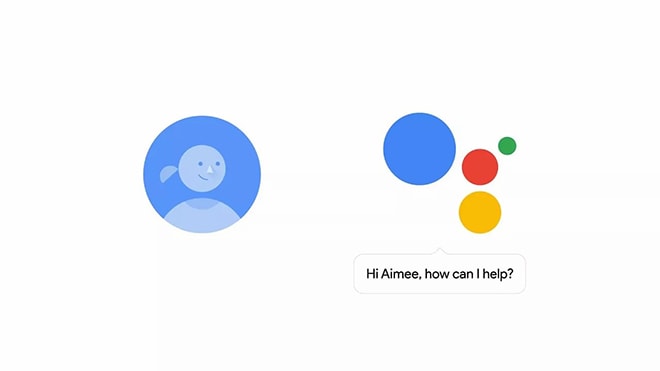
Launched in 2016, Google Assistant, i.e., the AI-enabled, voice-powered virtual assistant from Google, has made significant strides. It’s considered one of the more advanced virtual assistants.
Google has entered into partnerships with several companies and made Google Assistant available on a wide range of devices, e.g., smartphones, fridges, headphones, and cars.
You need to install and configure Google Assistant on Windows, Mac, and Linux PCs since it’s not readily available on these.
Google Assistant supports both voice and text entry, and it uses natural language processing. It offers various services, e.g., voice commands, voice searching, voice-activated device control, helping with tasks, finding information online, sending reminders, making appointments, translating in real-time, etc.
70% of requests to Google Assistant are in natural language and not in typical keywords like people type for Google searches.
Google Assistant is playing a major role in the growth of smart TV and smart wearable markets, causing them to grow at a CAGR of 121.3% and 41.3%, respectively.
Google continuously expands the reach of Google Assistant, and currently, it works with 50,000 smart home devices from more than 10,000 popular brands.
9. ELSA Speak
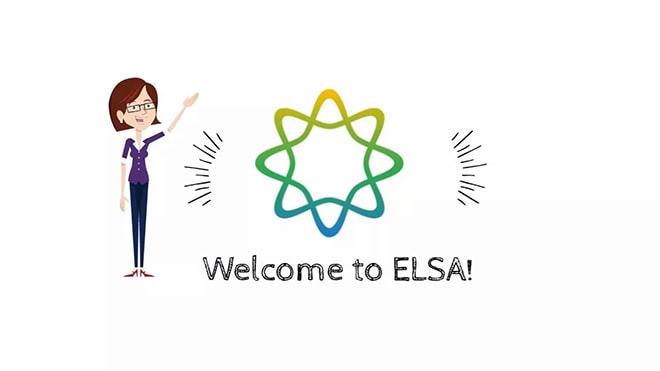
ELSA Speak is a popular AI-powered app that helps people learn how to speak English. Users of this app can learn how to speak English and pronounce English words with the help of short dialogues. AI helps them with instant feedback. Therefore, users can expect to make quick progress.
Artificial Intelligence technology used by Elsa was trained on voice data of people speaking English with various accents. This allows Elsa to understand the speech patterns of also non-native speakers, setting it apart from most other voice recognition technologies.
This app uses speech recognition technology. Its website claims there have been over 50 million downloads of its app. ELSA Speak also claims to have over 34 million users in 195 countries.
There is a trial period of 7 days. Subsequently, the user will need to buy ELSA Pro. ELSA Speak is available on Android and iOS. However, there are no PC or Mac versions at the time of writing.
10. Socratic
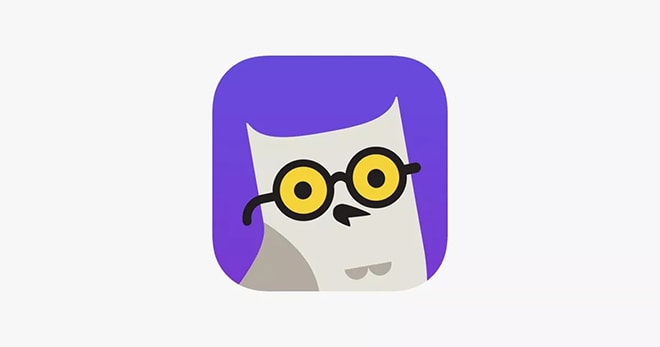
Socratic is an AI-powered app that helps students with math and other homework. Google announced in 2019 that it had acquired this app.
Students can take pictures using their phone camera. Subsequently, Socratic uses its AI capabilities to provide visual explanations for the concepts that students need to learn.
Socratic uses text and speech recognition, and it can support learning science, math, literature, social studies, etc. This app is available on Android and iOS app stores, and it’s compatible with the iPad.
The statistics from Google Play show over 10 million downloads at the time of writing. The Socratic iOS app enjoys high popularity, too, as the high rating in the Apple App Store indicates.
Other Top Trending AI Apps
It is always hard when writing a top 10 list to pick between so many great contenders. Given how hot the AI market is right now, and how we get so much feedback asking why we didn't include such and such technology, we have decided to include a list of notable mentions of the top AI tools out there that we couldn't fit into the top 10 AI apps.
1. Microsoft Copilot for Windows
Copilot is an artificial intelligence tool that helps with tasks such as writing code, code testing, documenting existing code, answering questions, creating images, etc.
While GitHub Copilot was launched in late 2021 with real-time auto suggestions in the code editor, Microsoft announced they are actively working on integrating Copilot into other areas like Windows and Microsoft 365 services.
Microsoft has announced Copilot as the new AI personal assistant for Windows 11. Users can ask Copilot to answer questions, summarize text, create images, etc. They could also ask Copolit to perform actions on Windows 11, like changing the screen theme, taking a screenshot, etc.
Microsoft is ending the support for the Cortana AI app as a personal assistant on Windows starting in late 2023. Cortana is currently supported by a range of devices, including Windows Mixed Reality, Microsoft Band, iOS, Android, and Windows mobile devices, Alexa, iPad, Android tablets, etc.
2. FitnessAI
FitnessAI was developed by OpenAI, the company responsible for ChatGPT. Released in 2018, it is an AI-powered fitness tool designed to optimize workout routines.
It employs machine learning algorithms to personalize exercise plans for users. By analyzing individual preferences, goals, and physical attributes, FitnessAI tailors workout regimens to maximize efficiency and results.
The technology utilizes data from its extensive database, encompassing various exercises, techniques, and fitness strategies. Users input information such as their fitness objectives, available equipment, and past workout experiences, enabling FitnessAI to generate custom routines. A really nice added touch is that the platform adapts these plans over time by learning from user feedback and performance data.
By intelligently processing user inputs and considering individual goals, FitnessAI creates workout regimens designed for maximum efficiency. Users can now bypass generic routines and see their routine gain from increased customization as the app adapts and evolves, tracking progress and making adjustments in real-time.
The company claims to have mapped 5.9 million workouts, including 40,000 weight lifts, in order to create as accurate a model as possible.
Utilizing a mix of supervised and unsupervised machine learning techniques, FitnessAI's recommendations are backed by data from a wide range of fitness sources. This comprehensive approach ensures that users receive guidance that's both scientifically sound and tailored to their specific needs and goals.
FitnessAI is available on both Android and iOS. The app's free version provides an enticing taste of what FitnessAI has to offer, while the premium subscription unlocks a host of advanced features.
3. Marlee
Marlee is a performance and collaboration AI designed to help teams work better together. It delivers personalized coaching based on real team data and enables leaders to build high-performing, highly aligned, and inclusive teams.
Marlee is used for leadership development, employee growth, and improving collaboration across hybrid and remote teams. It’s especially helpful for companies that want to embed continuous improvement into their team culture.
Marlee offers flexible pricing plans depending on team size and needs. Users can access insights through interactive dashboards, track progress via Boards, and get clear action steps tailored to team dynamics. It’s a smart companion for modern teams aiming to scale with clarity and cohesion.
4. Synthesia AI
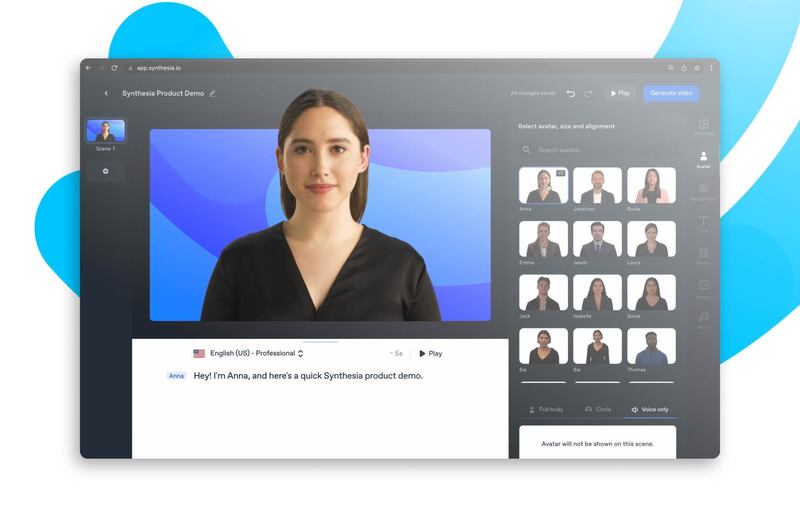
Synthesia AI was released back in 2018. It is another advanced OpenAI artificial intelligence app. It focuses on video content generation.
This AI system is able to use inputted text and transform it into captivating video narratives. It utilizes avatars, expressions, and voice modulation to create powerful and appealing videos.
Synthesia AI's capabilities stem from its comprehensive training on a vast trove of internet data. The tool caters to all levels of creators, boasting an intuitive interface that simplifies the video creation process.
Complimenting the free version is the Synthesia AI Pro subscription. This enhanced version offers features like accelerated rendering and access to a diverse array of avatars and animation styles.
Synthesia AI is powered by OpenAI's advanced GPT-4 model. It has been well-received by video makers all over the globe.
5. FaceApp AI

FaceApp AI was released back in 2017 by FaceApp Inc. It has already grown into a popular mobile application that uses artificial intelligence to manipulate and transform facial images in various ways.
FaceApp applies filters and effects that can change a person's appearance, age, and gender and even simulates different hairstyles and makeup looks. It set a new standard for self-transformation and image editing when it was launched, which is the main reason credited for its enormous success worldwide.
FaceApp AI offers a range of features in both its free and premium subscriptions. While the free version provides ample tools for creativity, the premium subscription unlocks a set of additional filters and effects.
According to statistics published on BuisnessofApps.com, "FaceApp generated $80 million revenue in 2022, $30 million more than in 2021." The application "had an estimated 33 million users who access the app at least once in 2022.
6. Lensa AI

Developed by Prism Labs and released back in 2016, Lensa AI uses advanced AI algorithms to enhance and retouch portrait photos. Lensa AI is able to harness the power of AI-driven visual analysis to allow even the least photography-savvy people to achieve professional editor-like results.
Lensa uses powerful artificial intelligence algorithms to retouch portrait images according to the user's requirements. It is able to adjust features such as hair, skin, and eyes, as well as clothing and background elements.
While there is a free trial version (only lasts 1 week) of the app available on both Android and iOS, users are required to pay a subscription of $35.99 USD per year plus an additional fee for generating avatars. This pricing structure is arguably why the app's number of users hasn't reached the stratosphere. However, the number of users is still healthy and growing steadily.
Lensa recommends that people submit around 20 selfies to ensure the best portraits. These can include a wide variety of backgrounds and facial expressions, etc.
7. Seeing AI
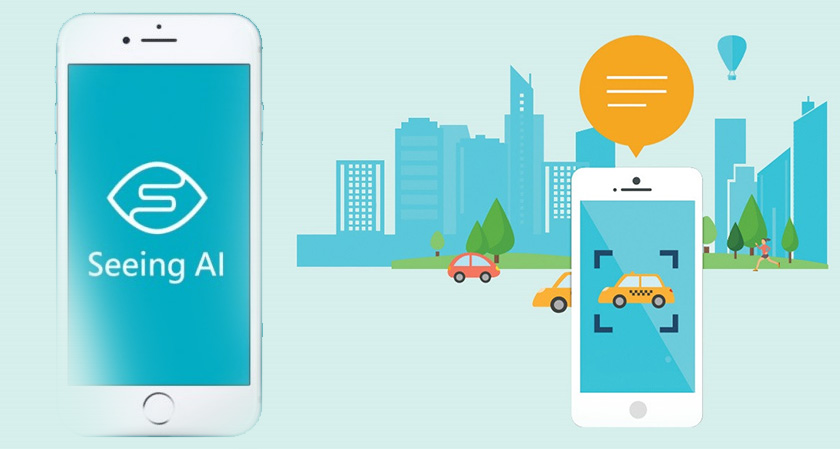
Seeing AI is another Microsoft AI. This artificial intelligence application is to help redefine accessibility for visually impaired individuals.
At its core, Seeing AI offers an impressive range of features that cater to diverse needs. It features a text recognition feature that is powered by OCR (Optical Character Recognition) technology to help visually impaired people by reading text aloud. This function is incredibly useful for reading books, signs, labels, digital screens, etc.
The object recognition function uses the device camera to enable it to identify and then describe objects that it recognizes. This allows visually impaired people to understand their surroundings better. Examples include identifying currency denominations to distinguishing between products on a store shelf.
The app's facial recognition feature can describe facial emotions and characteristics, allowing the user to once again better understand the people around them and their interactions.
Seeing AI, like all artificial intelligence and machine learning applications, is in its infancy. Accuracy has already been vastly improved since its original launch, something that promises better user satisfaction the more the app is able to learn.
8. Ask AI
Ask AI is a ChatGPT-like chatbot that essentially fulfills all the same roles. It is relatively recent to the marketplace, so has yet to prove itself or make much of a dent into ChartGPT's role at the top.
According to its website, "Ask's tag-less AI technology analyzes customer communications, revealing the customer voice in one sentence insights that show you what to focus on." The app is able to deal with both structured and unstructured data, which is a big positive for individuals and companies that wish to train Ask on their own data pools.
While anyone can use it, the company's website seems to be orientated towards making this a powerful business tool that will allow companies to extrapolate insights.
9. Replika AI
Replika AI is an interesting take on the chatbot craze. Rather than being a general-purpose chatbot, Replika AI is designed to be a friend who is tailored specifically to each individual user.
Users are able to create their own avatars and engage in conversation with their own AI friends. Replika AI learns from interactions, which means that it adapts to users' preferences over time.
The goal of this AI is to be more human than human, meaning that users can rely on it no matter what type of person they are and what interests and needs they might have according to their own personality.
One of Replika AI's standout features is its ability to remember previous conversations, allowing for continuity and a sense of an almost actual emotional connection.
This feature enhances the user experience, as the AI can reference past discussions, making conversations feel more natural and personalized.
The emotional component is where Replika AI shines. It's designed to explore human relationships and offer emotional support and companionship, making it appealing to users seeking empathetic conversations.
The AI's ability to engage in discussions about feelings, emotions, and personal experiences can be quite remarkable, offering a sense of comfort to users. Many Replika users have found a companion to share their feelings, celebrate wins, trade weird internet memes, etc.
According to Replika iOS and Android app descriptions, "Your chat is a safe, judgment-free space. It’s just you and your Replika. If you’re feeling down, or anxious, or you just need someone to talk to, your Replika is here for you 24/7".
However, ethical concerns related to emotional dependency on AI companions should not be overlooked. While Replika AI provides a supportive environment, it's essential for users to maintain awareness that the AI's understanding of emotions is fundamentally different from human comprehension.
Replika is available on Oculus, Android, and iOS. Basic interactions are free for Replika users. Users need to opt into one of Replika's subscription models to join millions talking to their own personal chatbots via more enhanced features.
10. Perplexity
Perplexity is a free AI-powered answer engine designed for research and information discovery. Like other generative AI tools, it leverages advanced natural language processing and machine learning models to gather data from a variety of sources.
Its use cases embrace research, learning, content creation, and exploring topics of interest.
Perplexity offers free and paid (Perplexity Pro) plans. The former is basic, with limited capabilities of the tool, while the latter offers advanced features and upgraded AI models for deeper research.With Perplexity, users can get quick and accurate answers with links to the sources of information. The tool has a clear user interface and can be integrated with other software solutions.
The Best AI Apps by Category
We’ve explored 10+ top AI apps. However, with new AI solutions emerging nearly every day, it’s hard to cover them all in a single blog post. Below is an expanded list of the best AI apps classified by category — you’ll surely find some that suit your industry and business domain.
Top AI apps in different categories
- Chatbots (ChatGPT, Claude, DeepSeek, Grok)
- AI apps for content creation (Writesonic, Jasper)
- AI apps for image generation (Midjourney, DALL-E)
- AI video generators (Synthesia, Runway, Filmora)
- AI apps for image editing (Lensa AI)
- AI apps for social media (Sprout Social, Brandwatch, FeedHive)
- AI-powered search engines (Perplexity, Microsoft Bing, Google AI Overviews)
- AI-powered grammar checkers (Grammarly, Wordtune)
- AI for design and presentations (Canva Magic Studio, Gamma)
- AI project management tools (Asana, ClickUp)
- AI apps for learning (ELSA Speak, Socratic)
- AI apps for physically impaired people (Seeing AI)
- AI apps for transcription (Otter AI)
- AI apps for scheduling (Calendly, Reclaim, Clockwise)
- AI resume builders (Kickresume, Enhancv)
Planning to Launch an AI Application for Your Business?
The AI apps we just reviewed will certainly show you how AI can be valuable to your business. However, developing AI apps can be hard! AI is a niche skill. Therefore, you should consider taking help from a reputed software development company like DevTeam.Space. It's a vetted community of expert software engineers, including web and mobile developers, who can help you build your own unique AI app for any type of platform.
Frequently Asked Questions on AI Apps
An AI application is any application with machine learning or AI integrations, in general, into its functions and services. AI has helped companies such as Amazon and Netflix to improve their customer experience and encouraged more and more people to use these AI applications.
Currently, chatbots are one of the leading areas of AI development. AI apps, such as ChatGPT by OpenAI and Apple’s Siri are the best in this field to have your own unique chatbot AI companion experience. Other examples include Fyle, an intelligent expense management space that comes with direct integrations, like Google Chrome extension and G Suite add-ons; Lensa AI, a photo-editing app; Socratic, an AI-powered tutoring app, etc.
The cost of creating a unique AI application depends on the level and complexity of the artificial intelligence required. Since AI development requires developers who can create sophisticated algorithms any company developing AI web or mobile apps will need to spend more to hire the best developers.
Related AI App Development Articles
Learn more about AI apps from our expert articles:


